
Customers leave one of the branches of Qatar Islamic Bank in Doha April 13, 2016
12 August 2017: Being heavily dependent on foreign funds, the Qatari banking system was the first sector to be negatively influenced with some Gulf firms and individuals tended to pull their deposits after four Arab states cut their diplomatic ties with Doha on June 5.
In the same month of the boycott, Gulf-based media announced that Saudi Arabia, UAE and Bahrain withdrew $16 billion of short-term deposits from Qatari banks.
This has led to a sharp drop in deposits of non-residents of Qatar in 18 banks by 7.6 percent to QAR 170.6 billion ($47 billion) in June from a month earlier, according to the Qatar Central Bank.
From ‘Stable’ to ‘Negative’ outlook
Few days after the boycott announcement, GCC countries reportedly ordered their banks to halt transactions with Qatari banks. This action has led economic analysts to voice concerns about the sector.
“If Qatari banks struggle to rollover their external debts, they could be forced to shrink their balance sheets and tighten credit conditions,” said Capital Economics’ Middle East economist Jason Tuvey in a June report.
Cyprus-based CI Ratings also said in the same month that the sovereign credit and liquidity of the banking sector will be impacted.
As crisis prolonged, international rating agencies Fitch and S&P Global have put Qatar on negative watch in late June.
Weakening domestic environment and funding of banks prompted Moody’s Investors Service to downgrade nine banks’ outlook from stable to negative on July 5.
Moody’s attributed the action to economic and financial risks arising from the ongoing dispute between Qatar and boycotting countries.
In the same month, CI Ratings shot negative outlook to six Qatari banks on potential risks. The six banks were the Qatar National Bank (QNB), Ahli Bank of Qatar, The Commercial Bank, Doha Bank, Qatar Islamic Bank and Qatar International Islamic Bank (QIIB).
All this has led Moody's Investors Service to downgrade the whole Qatari banking system to negative from stable on August 6.
As a result of the weakening operating conditions and continued funding pressures facing Qatari banks, Moody’s said the outlook represents its expectation of how bank creditworthiness will evolve in Qatar over the next 12-18 months.
"Against this backdrop, Qatari banks' profitability will likely decline, with return-on-assets declining to around 1.4 percent for 2017, from 1.6 percent in 2016, driven by increases in funding and provisioning costs," vice president at Moody's Nitish Bhojnagarwala stressed.
Attempts to keep deposits stable
After it was hit by an outflow of money due to sanctions, local deposits in Qatari banks shrank 1.8 percent from the previous month in June, according to official data.
The hardest hit bank was the Qatar Islamic Bank (QIB), which was reported to be aiming to boost its deposit base by offering certificates of deposit in Qatari riyals and U.S.
dollars, Reuters reported in August.
QIB’s customer deposits fell to QAR 96.9 billion ($26.6 billion) at June-end from QAR 103.9 billion at the end of March, according to its financial statements.
“Qatari banks need to diversify their sources of funding. They have to shore up their deposits raising funds domestically, so it is to be expected to see higher rates,” head of economic research for the Middle East and North Africa at Standard Chartered Dima Jardaneh told Reuters this month.
To offset the impact of pulling out deposits, Doha's sovereign wealth fund was reported to have deposited over $10 billion in local banks.
More challenges are anticipated as a number of banks in Egypt, Saudi Arabia, the United Arab Emirates and Bahrain have reportedly refrained from extending deposits with Qatari banks.
Sources familiar with the matter, requesting to remain anonymous, told Bloomberg on August 6 that these banks are worried about facing repercussions from their governments had they continued business ties with Qatar.
The news indicated that foreign deposits at Qatari banks might fall further. Deposits of non-residents of Qatar in 18 banks already dropped 7.6 percent to QAR 170.6 billion ($47 billion) in June from a month earlier.
Pursuing more solutions, the largest Arab bank in terms of asset the Qatar National Bank (QNB) and international banks have reportedly discussed accessing loans or issuing bond sales in the fourth quarter of 2017 to secure liquidity.
Qatari banks are now in a situation where they have to prove stability of their market to keep foreign deposits safe.

Comments
Leave a Comment